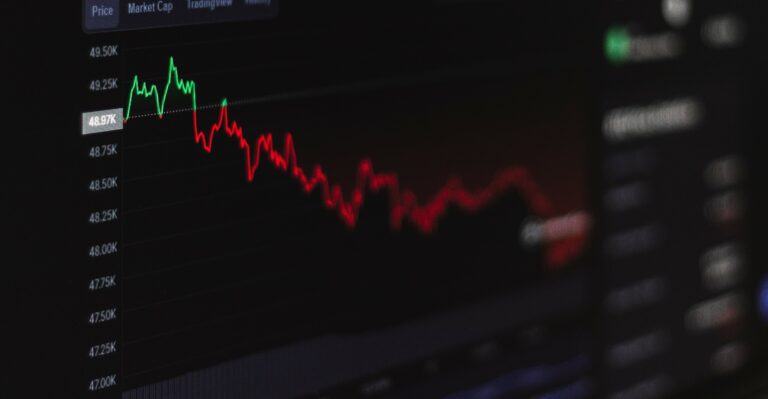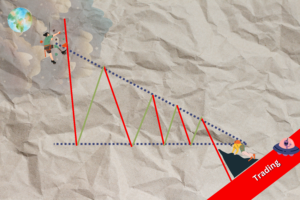The second triangle: the Descending Triangle
Read MoreWhy Do People Hold onto Failing Assets?
A look into the psychological aspect that failed many traders.

Along the way of my writings, I’ve often seen articles or reports stating that many investors and traders, especially retail ones, lose money instead of making money as they go forward with their trades. When you keep on seeing something like that, you can’t help but question the reason why this is happening.
I’ve done a few readings, looked far and wide, and also looked deep into my own behavior that could shed light on this phenomenon. Out of many, this article seeks to look at one major phenomenon — where many traders/investors hold onto assets that are losing, instead of letting them go.
An asset is in the red, what should you do?

Previously, we’ve spoken about the future & present value, and we’ve touched along the way on the concept of Net Present Value, which is to see how much something is worth today when you factor in the growth that it can bring. If we remember correctly, the example we used was of a vending machine that can generate a steady annual income.
To see how much you should pay for the machine, we use the present value to see how much the money it will make is actually worth today, and from there we sum the present value to get the net present value. If you want to read more on that, you can head to the article below:
Fundamental: Discounted Cash Flow (Part 1)
That is if we are speaking of vending machines. In this case, we want to buy stocks, not vending machines. If we’re speaking of vending machines, we can look at the future cash flow it can generate, but what about stocks? For stocks, we use the free cash flow!
A cost-efficient mind & not-so-cost-efficient decisions

Throughout my reading, I’ve stumbled upon an enlightening insight into the human mind — we have two sets of minds! Yes. One that is commonly known as intuition, the fast-thinking part of the brain that would tell you to stop when the light is red, the one that tells you it might be dangerous when the forest is too quiet, and also the one that might lead some of us to be racist.
This is the mind that is trained from experience to give the quickest response to a stimulus. Someone marching angrily at you? Avoid. A baseball flying towards your head? Avoid. Your long-lost high school friends suddenly reach out through Facebook? Avoid — they want to borrow your money.
Paired with this mind is the slower kind of mind, one that takes time to carefully process anything that is being brought to it. What’s 1097 times 232? *Beeping and heavy processing sound* 254,504! You can’t intuitively figure that out, unless you’re some kind of mathematical genius, or are heavily trained in mathematics that multiplication of large numbers now becomes an instinct.
However, here’s the thing — not many of you got 254,504 above. Many would get “Nah screw that, get to the point”. This is something that our brain is scarily good at — being labor-efficient, despite the consequences.
“Follow your heart — not!”

What many of us would think is that since investing or trading is something that is very technical, it’s obviously our slow-thinking mind that is more critical and analytical in charge, right? They’re not wrong! Our slow-thinking, more-careful brain, is often the one in charge of the calculation of risks and returns.
A lot of the calculations are done by that careful little brain. However, decision-making is another thing. When you want to decide if a stock is worth holding or not, you’re essentially trying to gaze into the future. Something that is almost impossible to be entirely certain of.
Before we proceed, here are a few fun facts — when faced with massive stress, our slower-critical brain would give up and let intuition take the wheel. Our slower brain also has a way of being biased toward our intuition, where instead of using the energy to actually measure the probabilities, it uses that effort to mask our intuition to look rational and logical.
What happens in the brain that makes me hold bad assets?

Let’s get down to business. A stock you hold is failing and you saw it, what happened next? You look at the reds and you start to tell your critical mind to do its job and start analyzing. It does its job, it looks into the financials or the stock chart patterns. This little mind has completed the report, ready to send it to you, until your fast-intuitive chimes in.
Have you heard of the story of how Warren Buffet persisted when the stock was falling? About those dudes who are now millionaires because they held onto cryptos when no one else is? Or about how that one guy who regrets giving away what is now billions worth of Bitcoins for some pizzas?
Before that little report ever arrives at your desk, your intuition has now intercepted. The next thing you know, the report that you get is one filled with the classic Buffet stories, pizza Bitcoin dude, and some other things that somewhat led you to hold on to it.
“But it shouldn’t be that easy!”
Of course, it’s not easy for us to fall prey to intuition. After all, we’re not so dumb to easily succumb, right? We’re not dumb, but we are tired. Some of us are not full-time investors, some work two or three jobs just to make those extra dollars for investment, and now we have to face the fact that our asset is failing.
Remember how our brain is a very cost-efficient fella? There’s only so much that you can think of in one day. You think of work, family, finance, how your favorite time is being absolute trash this season — so many things that when another important thing comes in, you’re already too tired your analytic mind falls prey to intuition.
How to solve it?
Well, on the brain issue, is to improve your brain with training. Train yourself to handle more and more analysis, and also train yourself to tell apart an analysis from mere intuition. There’s no other way around that.
On another note, for every stock or whatever that you invest in, be sure to have an exit plan. It’s important for you to set a price level where regardless of what happens, if the asset reaches that price, you let it go. It’s not a confirmed failure, but it’s too risky to be holding it at that point.
Or you could invest in funds, where instead of burdening your brain with all the big thinks, burden someone else’s brain with it. Of course, you will still need to use your brain when investing in funds. The good side of it is that the person who will have to think about managing the fund is most likely only burdened to think about the funds, unlike you who are working two to three jobs.
Bottom line
- Our mind is separated into intuitions and critical thinking.
- Our mind tends to conserve energy and go towards the quickest decision available via intuition.
- Our mind can deceive us by making intuitions look like a product of critical thinking when it’s just intuition.
- We usually hold onto failing assets because we follow our intuition.
- Even when we think we are being critical, sometimes our mind isn’t well-trained or is just too tired, so we unconsciously resort to intuition.
- To overcome this, train your mind to be analytical, try having an exit plan, or you could just invest in funds.
The key takeaways/market update is a series by AxeHedge, which serves as an initiative to bring compact and informative In/Visible Talks recaps/takeaways on leading brands and investment events happening around the globe.
Do keep an eye out for our posts by subscribing to our channel and social media.
None of the material above or on our website is to be construed as a solicitation, recommendation or offer to buy or sell any security, financial product or instrument. Investors should carefully consider if the security and/or product is suitable for them in view of their entire investment portfolio. All investing involves risks, including the possible loss of money invested, and past performance does not guarantee future performance.
Trading Dow Pattern the Triangle Pattern (Part 1)
The first triangle: the Ascending Triangle
Read MoreFunds: Equity Funds (Part 3)
How to choose between equity funds based on companies’ earnings...
Read More



